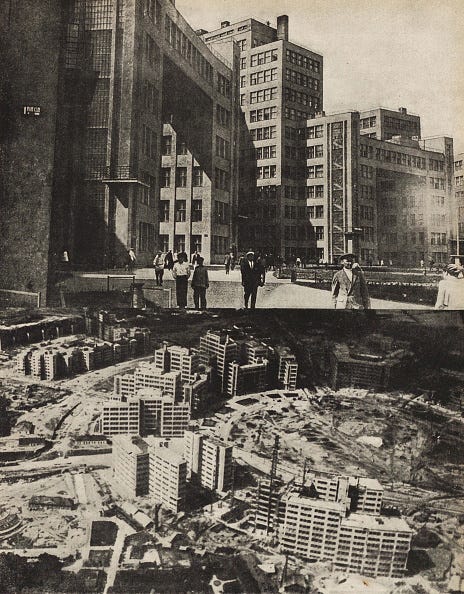This lecture treats the central (and, for mainly political reasons, the most controversial) event of the Ukrainian twentieth century: the famine of 1932-1933, which Ukrainians call Holodomor. This is an event I sought to present clearly in Bloodlands. Subsequent research has increased the number of the dead somewhat (to about 3.9 million) but confirmed the main finding: the famine in Ukraine was political, a result of choices made in the Kremlin in the knowledge of their consequences

The video is here and the podcast version is here or here.
Reading:
Snyder, Bloodlands, chapter 1
Plokhy, Gates of Europe, chapters 20, 21.
Matthew D. Pauly, Breaking the Tongue: Language, Education, and State Power in Soviet Ukraine, 1923-1934, Toronto: University of Toronto Press, 2014, conclusion.
Terms:
kolkhoz=collective farm
1924-1927 Mykola Khvilovyi, "literary discussion"
Mykola Skrypnyk commissar for education 1927-1929
collectivization
"Dizzy with success"
kulak/dekulakization
July 1932 non-aggression pact
central committee, politburo
State police: Cheka, GPU, OGPU, NKVD
Lazar Kaganovich
Vsevolod Balyts'kyi
Polish Military Organization
January 1934: Polish-German non-aggression declaration
January 1936: 15,000 Polish German families ordered to Kazakhstan
August 1937 Commissar for Internal Affairs Order 00485 on the 'Polish Military Organization"
111,091 executions, 79.4% arrested executed.
Specific policies:
1. Return of grain advances. On 18 November 1932
2. Meat penalty. 20 November 1932.
3. Black list, 28 November 1932
4. National deviation and punishment of party, 5 December 1932
5. Affirmation of grain requisition quota, 20 December 1932
6. Peasants banned from cities. 14 January 1933
7. Ban on flight from Ukrainian republic. 22 January 1933




Professor Synder vividly describes the heart-wrenching story of how up-to-4,000,000 Ukrainians were starved to death to seize their wheat to pay for the importation of industrial goods for the Five Year Industrial Plan.
This was portrayed in the documentary HARVEST OF DESPAIR: THE UNKNOWN HOLOCAUST (Canada, 1984).
Before diplomatic relations were established with the Soviet Union in 1933, Washington depended heavily on journalist reports from Moscow. Walter Duranty, the New York Times reporter in Moscow, won the Pulitzer Prize award in 1932 for his reporting.
Later it was revealed that Duranty had totally ignored the Ukrainian famine (although he did acknowledge to a British diplomat that he was aware of this dreadful calumny). Years later there was an effort to revoke his Pulitzer Prize. (Duranty’s false reporting was described in excruciating detail in S. J. Taylor’s STALIN’S APOLOGIST). The NYT reviewed the facts and ultimately decided not to request a revocation of Duranty’s false reporting.
This is an extraordinary example of how Washington’s over dependence on daily journalist reporting can have a dreadful impact on our understanding of foreign situations.
As a Foreign Service Officer, during the Congo crisis of 1964, one of my responsibilities was to provide The Secretary and others with a ‘factual correction’ of stories that they read in the New York Times and Washington Post, as they came in limos to their offices.
On occasion, my ‘corrections’ were minor. At times they were major. Young journalists were reporting from Congo. Often their judgment and knowledge were scanty.
I applaud the few journalists who, in Vietnam and elsewhere, got their boots muddy as they ferreted out insights as to what really was happening. This seldom occurred in Africa in the 1960s.
Regarding Vietnam, anyone who read Bernard Fall’s and Robert Shaplen’s books knew that there was no ‘light at the end of the tunnel’ and that nationalism was the dominant aspect in this war. As a Foreign Service Officer with a distinguished record for my ‘rambunctious’ activities in the Congo, at times with a M 16 and .45, I was a prime candidate for LBJ’s Vietnam War.
Twice, in 1965 and 1967, our ambassador in Saigon ‘asked’ me two join him. Twice I refused.
Regarding Iraq and Afghanistan, I surmise that some ‘boots on the ground’ journalists witnessed early that we were on a ‘fool’s errand.’ Only in retrospect did this become obvious to folks in Washington and elsewhere.
I urge caution when we read journalist reports on foreign affairs. Professor Snyder and other experts provide timely insights that often are ignored in daily reporting (from journalists and from our embassies). Solid information is available if one seeks it from ‘boots on the ground’ reporters and from scholars/practitioners who understand the soul and substance of their areas of expertise.
I’m sorry if this upsets anyone here, but I prefer reading to listening to podcasts and audio files. The last time I made a comment like this I was told by admiring fans of Mr. Snyder that he is such a busy man. I’m truly glad he is busy and I look forward to his next book, which will probably be on Ukraine, judging by what he’s been presenting here for the past year+. But I didn’t pay two years of subscription in order to wait to read the next book. I’m sorry for my negativism and I’m sure I’ll be hushed by one or more admirers, but I really, really do prefer to read. I’m just expressing myself and my frustration, sorry.